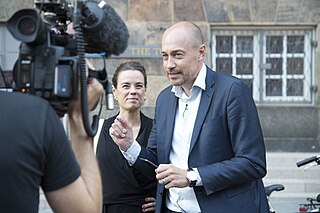Related Research Articles
The Technical University of Denmark, often simply referred to as DTU, is a polytechnic university and school of engineering. It was founded in 1829 at the initiative of Hans Christian Ørsted as Denmark's first polytechnic, and it is today ranked among Europe's leading engineering institutions. It is located in the town Kongens Lyngby, 12 kilometres (7.5 mi) north of central Copenhagen, Denmark.

Frederik X is King of Denmark. He acceded to the throne following his mother's abdication on 14 January 2024.

Aarhus University is a public research university with its main campus located in Aarhus, Denmark. It is the second largest and second oldest university in Denmark. The university is part of the Coimbra Group, the Guild, and Utrecht Network of European universities and is a member of the European University Association.
Education in Denmark is compulsory for children below the age of 15 or 16, even though it is not compulsory to attend Folkeskole. The school years up to the age of fifteen/sixteen are known as Folkeskole, since any education has to match the level offered there. About 82% of young people take further education in addition to this. Government-funded education is usually free of charge and open to all. Denmark has a tradition of private schools and about 15.6% of all children at basic school level attend private schools, which are supported by a voucher system.
Peter Kurrild-Klitgaard, is a Danish political scientist with a particular interest in public choice analysis and classical liberalism.
The Villum Foundation ; formerly Villum Kann Rasmussen Foundation was set up in 1971 by civil engineer Villum Kann Rasmussen (1909–1993). 10 years later, he set up the Velux Foundation. Rasmussen was the founder of VELUX and Velfac, Danish window companies. Both foundations are part of VKR Holding A/S, owned by the Rasmussen family and the Villum Foundation, which is the main shareholder.

The first high-speed railway in Denmark was the Copenhagen–Ringsted Line, completed in late 2018 and opened in 2019. Further high-speed lines are currently under planning.
Gunhild Moltesen Agger is a professor in Danish media history at Aalborg University. She conducts research in media science, focusing on Danish television drama and film, crime fiction and national identity in a globalized world.

Kirsten Gram-Hanssen is a Danish professor at Department of the Build Environment of Aalborg University in Copenhagen. She graduated Master from Department of Social Science at the Technical University of Denmark (DTU) in 1991 and in 1996 she was awarded a Ph.d.

The Frederiksen I Cabinet took office on 27 June 2019 and succeeded the Lars Løkke Rasmussen III Cabinet following the 2019 Danish general election. Headed by Prime Minister Mette Frederiksen, it was a minority government consisting of the Social Democrats. It relied on parliamentary support from the Red–Green Alliance, the Socialist People's Party, and the Social Liberal Party.

Magnus Johannes Heunicke is a Danish journalist and politician who serves as a member of the Folketing for the Social Democrats political party. He was the Minister of Health from 2019 to 2022, and minister of elderly affairs from 2019 to 2021.
Anette Borchorst is a Danish professor of both Political Gender Research at CCWS Center for Comparative Welfare Studies and the Center for Labor Market Research (CARMA), the Department of Political Science at Aalborg University. Also, she is Head of the Department of Political Science at Aalborg University.

False information, including intentional disinformation and conspiracy theories, about the scale of the COVID-19 pandemic and the origin, prevention, diagnosis, and treatment of the disease has been spread through social media, text messaging, and mass media. False information has been propagated by celebrities, politicians, and other prominent public figures. Many countries have passed laws against "fake news", and thousands of people have been arrested for spreading COVID-19 misinformation. The spread of COVID-19 misinformation by governments has also been significant.

Since the beginning of the COVID-19 pandemic, there have been efforts by scientists, governments, and others to determine the origin of the SARS-CoV-2 virus. Similar to other outbreaks, the virus derived from a bat-borne virus and most likely was transmitted to humans via another animal in nature or during wildlife trade such as that in food markets. While other explanations such as speculations that SARS-CoV-2 was accidentally released from a laboratory have been proposed, such explanations are not supported by evidence. Conspiracy theories about the virus's origin have also proliferated.

The COVID-19 lab leak theory, or lab leak hypothesis, is the idea that SARS-CoV-2, the virus that caused the COVID-19 pandemic, came from a laboratory. This claim is highly controversial; most scientists believe the virus spilled into human populations through natural zoonosis, similar to the SARS-CoV-1 and MERS-CoV outbreaks, and consistent with other pandemics in human history. Available evidence suggests that the SARS-CoV-2 virus was originally harbored by bats, and spread to humans from infected wild animals, functioning as an intermediate host, at the Huanan Seafood Market in Wuhan, Hubei, China, in December 2019. Several candidate animal species have been identified as potential intermediate hosts. There is no evidence SARS-CoV-2 existed in any laboratory prior to the pandemic, or that any suspicious biosecurity incidents happened in any laboratory.

Pastel QAnon is a collection of techniques and strategies that use "soft" and feminine aesthetics – most notably pastel colors – that are used to attract women into the QAnon conspiracy theory, often using mainstream social media sites like Instagram, Facebook, Telegram and YouTube.
Søren Brostrøm is a Danish physician-scientist specializing in obstetrics and gynaecology, who serves as the current Director General of the Danish Health Authority. In May 2021, Brostrøm was elected a member of the Executive Board of the World Health Organization by the World Health Assembly.
Kasper Møller Hansen is a Danish political scientist and professor with the Department of Political Science at the University of Copenhagen. He specialises in attitude formation, voter behaviour and voter turnout.
This timeline includes entries on the spread of COVID-19 misinformation and conspiracy theories related to the COVID-19 pandemic in Canada. This includes investigations into the origin of COVID-19, and the prevention and treatment of COVID-19 which is caused by the virus SARS-CoV-2. Social media apps and platforms, including Facebook, TikTok, Telegram, and YouTube, have contributed to the spread of misinformation. The Canadian Anti-Hate Network (CAHN) reported that conspiracy theories related to COVID-19 began on "day one". CAHN reported on March 16, 2020, that far-right groups in Canada were taking advantage of the climate of anxiety and fear surrounding COVID, to recycle variations of conspiracies from the 1990s, that people had shared over shortwave radio. COVID-19 disinformation is intentional and seeks to create uncertainty and confusion. But most of the misinformation is shared online unintentionally by enthusiastic participants who are politically active.
Henrik Frandsen is a Danish politician serving as Member of the Folketing for the Moderates since the 2022 election. He was formerly mayor of Tønder Municipality.
References
- ↑ "Altinget - Alt om politik: altinget.dk". www.altinget.dk (in Danish). Retrieved 28 May 2022.
- ↑ Thompson, Derek (4 February 2022). "How Denmark Decided COVID Isn't a Critical Threat to Society". The Atlantic . Retrieved 28 May 2022.
- ↑ Kokkegård, Hanne (29 October 2021). "The HOPE project is honored for important Corona research - DTU Compute". DTU Compete. Retrieved 28 May 2022.
- ↑ "Professor får stor pris for at følge coronabekymringer". TV2 ØSTJYLLAND (in Danish). 29 April 2022. Retrieved 28 May 2022.
- ↑ "Forskningskommunikationsprisen 2022 — Uddannelses- og Forskningsministeriet". ufm.dk (in Danish). Retrieved 2022-05-28.
- ↑ "Research on Online Political Hostility - Meet the Team". School of Business and Social Science | Aarhus University (in Danish). Retrieved 28 May 2022.
- ↑ Rosenberg, Paul (8 August 2021). "A terrifying new theory: Fake news and conspiracy theories as an evolutionary strategy". Salon. Retrieved 28 May 2022.
- ↑ Edsall, Thomas B. (9 February 2022). "Opinion | Status Anxiety Is Blowing Wind Into Trump's Sails". The New York Times . ISSN 0362-4331 . Retrieved 28 May 2022.
- ↑ Thompson, Derek (26 September 2021). "How America Dropped to No. 36". The Atlantic . Retrieved 28 May 2022.
- ↑ Taylor, Adam (1 Feb 2022). "Researchers are asking why some countries were better prepared for covid. One surprising answer: Trust". Washington Post . ISSN 0190-8286 . Retrieved 28 May 2022.
- ↑ Paul, Mark (2 Feb 2022). "Caveat: We can't forget the necessity of Covid restrictions but don't dismiss what they cost us". The Irish Times . Retrieved 28 May 2022.